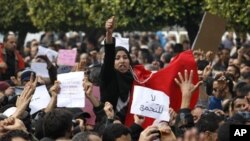Tunisia's prime minister has announced a transitional government that includes members of the opposition. He also eased restrictions on the press and human-rights groups. But the old regime holds the top posts and hundreds of people demonstrated against it in the capital.
Prime Minister Mohammed Ghannouchi included three members of the country's opposition in his newly named transitional government. He also announced the lifting of all media restrictions, along with the ban against the country's main human-rights group. At a news conference, he said the transitional government's priority was re-establishing security after days of looting and demonstrations, but he also promised political and economic reforms. Interim President Fouad Mebazaa has called for elections within 60 days.But the top posts - defense, finance, interior and foreign ministries - have been retained by members of the former government of ousted ex-president Zine el-Abidine Ben Ali. And several leftist and Islamist oppositions parties, banned under Ben Ali, were not included in the new Cabinet.
Even before the new government was announced, hundreds of protesters again massed on Tunis' main Habib Bourguiba Avenue chanting for Ben Ali's ruling RCD party, to go.
The RCD has to go, one angry man said, because it will just go back to its old tricks. The army has to stay, and give time for a real democracy to flourish.
Some Tunisians like Nabiha do not just want the party banned from politics, but also all the members of the old establishment. That includes the current interim leaders, Tunisia's longtime Prime Minister Ghannouchi and Interim President Mebazaa, the former speaker of parliament.
"People again are demonstrating in the streets to [PM] Ghannouchi 'out', Because this man was part of the system. He could not say he ignored [did not know] about the corruption. All Tunisians knew about that," Nabiha said.
But not everybody was protesting. In the capital Tunis, people returned to work and their everyday routines, although streets rapidly emptied by late afternoon, before the 6:00 pm curfew.
And more shops and outdoor markets were open, like this fruit and vegetable market on in the Tunis neighborhood of Bab el Khadra.
One elderly man at the market praised Prime Minister Ghannouchi as an honest man. Besides, he said, Tunisia's new interim government would be a temporary, to calm things. The next one, he predicted, would be brought in by the ballot box.
Related video report by Chris Simkins:




